We live in the age of wellness: wellness programs at work, wellness influencers, and wellness foods that were probably just as good for you before being labeled well. And it’s big business. Just look at all of the CBD products promising overall wellness that have yet to be scientifically studied. Or, I don’t know, Goop. According to the Global Wellness Institute, wellness is a more than $3.7 trillion market and the biggest future trend is mental wellness.
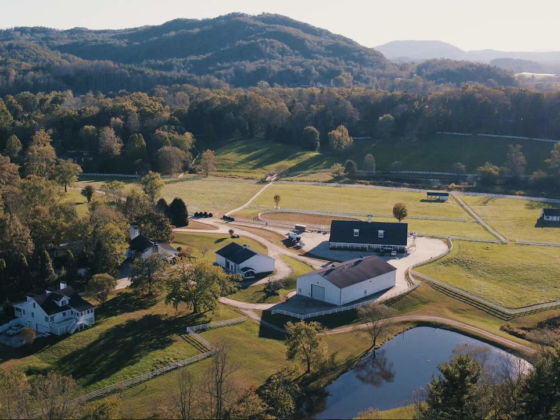

What It’s Really Like to Go on a Mental Wellness Retreat
Whether you blame it on toxic living environments or our consumerist need to buy anything that promises to fill the holes in our unsatisfied lives, wellness is an unavoidable topic in the year of our internet overlords 2019. Which is why, for the subset of people who can afford it, escaping to a wellness retreat is the ultimate vacation (and Instagram post).
The quest for wellness is what brought me to Horse Shoe Farm near Asheville, North Carolina, one afternoon in early April. Specifically, it was a quest to see how much good a wellness trip could do for a food-and-drink-focused writer whose health could best be described as not not well. I did, after all, start the sojourn with a lukewarm Wendy’s chicken sandwich at the all-too-horrid Newark International Airport.

Photo: Nickolaus Hines
Less than five hours after my flight from New York City landed, I was in Horse Shoe Farm’s chicken and goat pen with two newborn goats that looked like they might trip on their umbilical cords with every attempt at a step toward their mom, Bobby Marley. If wellness is forgetting a growing pile of deadlines and a bottomless pit of emails, it did not take long for me to find it.
The science behind wellness retreats
There’s a class of people very familiar with wellness. You can usually pick these people out because they mention wellness shortly after meeting them. Then there are the normies who chug along, drowning in the anxieties of modern life, maybe not even knowing they are unwell. There’s a middle ground in there somewhere, but you’d be hard pressed to find it in many of the bustling cities in the US.
A growing number of wellness retreats and wellness-focused destinations are here to fix the ailments of the latter two categories of people, as well as bolster the wellness cred of the former. They’re idyllic, relaxing, and usually surrounded by beautiful nature. Horse Shoe Farm is one of these. It’s a short (and cheap, with Allegiant flights at the time of writing going for around $100) flight away from the Big Apple.
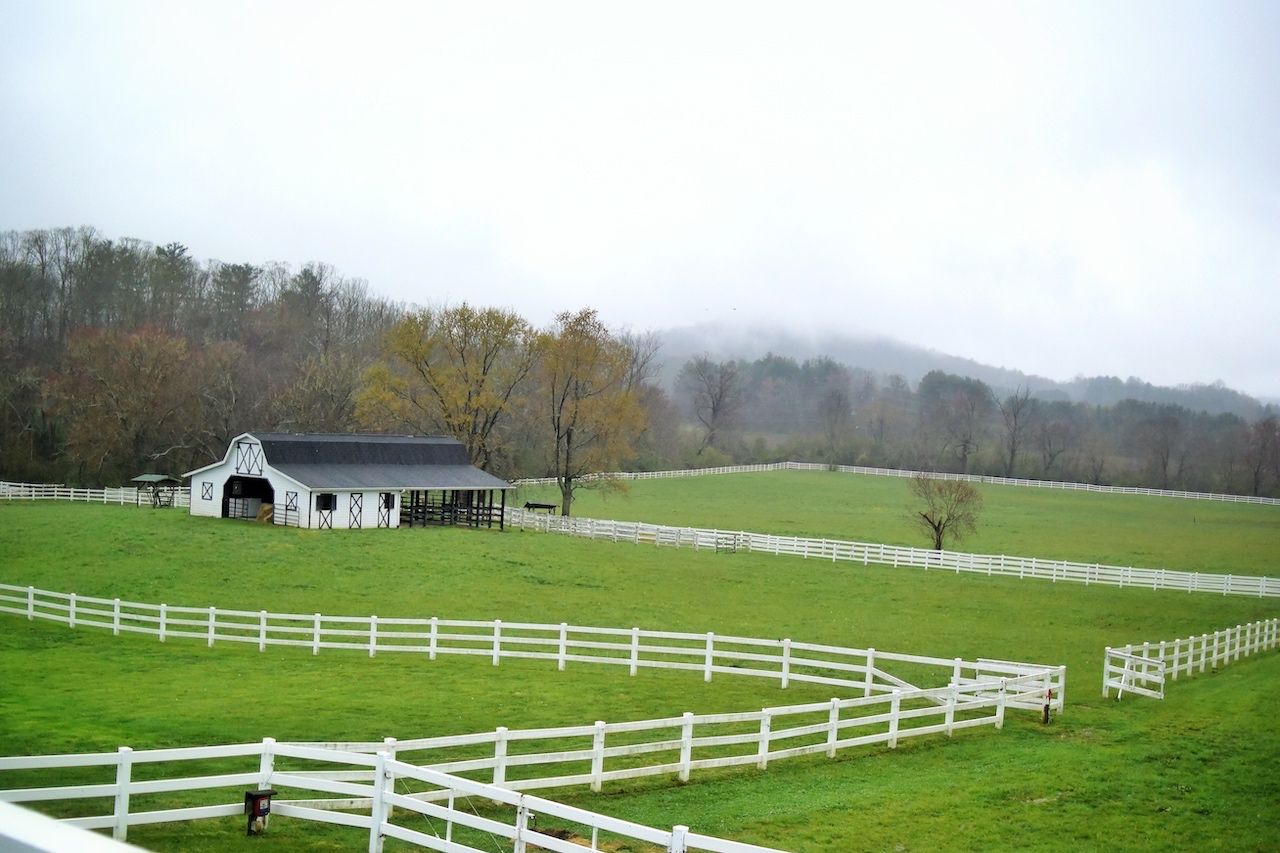
Photo: Nickolaus Hines
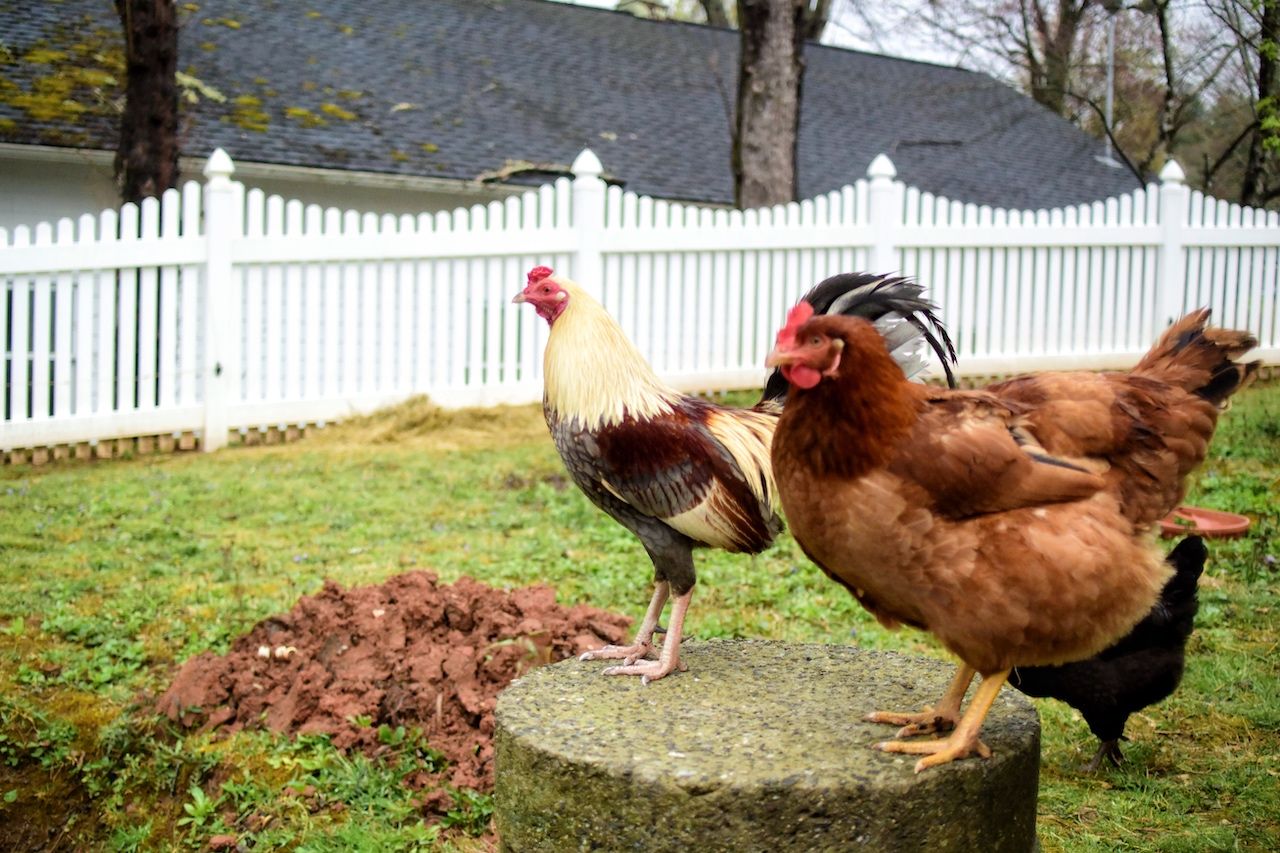
Photo: Nickolaus Hines
Horse Shoe Farm is mental health-focused yet also very much a working farm — one guest’s dog managed to get ahold of a chicken named Tenders, and Tenders was turned into soup. It’s run by Jordan Turchin, who grew up in Miami and worked in the film industry in New York and Los Angeles. These days, the 33-year-old is most likely to be seen taking care of farm duties with his hair tied back and wearing his crystal necklace.
He’s helped co-workers bond and couples escape. Along with taking care of the goats, chickens, and ducks, he’ll set up yoga classes in the meditation room and massages in the converted horse stables. He’ll help you out at the morning juice bar and point the way to the best nearby hikes. Or not. The point of Horse Shoe Farm is to interpret wellness in a way that makes you actually well rather than stressed about ticking off some 12-step plan. When asked for an example of success, Turchin recalled a New York couple that came phones in hand, but before long he “could just see [them] melting back to the earth.”
“The people who are plugged in are really plugged in,” he told me as we talked about life in New York. “But then you release and you’re like, ‘did I need that?’”
An escape to a wellness farm certainly made me question why I needed my phone other than to take photos of baby goats. The science behind the feelings, though, is sparse. One of the first published studies on wellness retreats made it into the Journal of Alternative and Complimentary Medicine in 2017. It had the telling and wordy title, “Do Wellness Tourists Get Well? An Observational Study of Multiple Dimensions of Health and Well-Being After a Week-Long Retreat.” The study concluded that, while it had its limitations in terms of participant size, “retreat experiences can lead to substantial improvements in multiple dimensions of health and well-being that are maintained for 6 weeks.”
“When on a wellness retreat, it is fairly easy to become engaged in healthy mindset patterns and routines simply because the retreat staff provide the necessary support and structure,” said Dr. Carla Marie Manly, a clinical psychologist in California. “By minimizing or eliminating contact with daily stressors (e.g., technology, work, etc.), offering healthy daily schedules, supplying wellness-oriented activities, and preparing wholesome foods, the retreat offers the ‘ideal’ environment for wellness.”
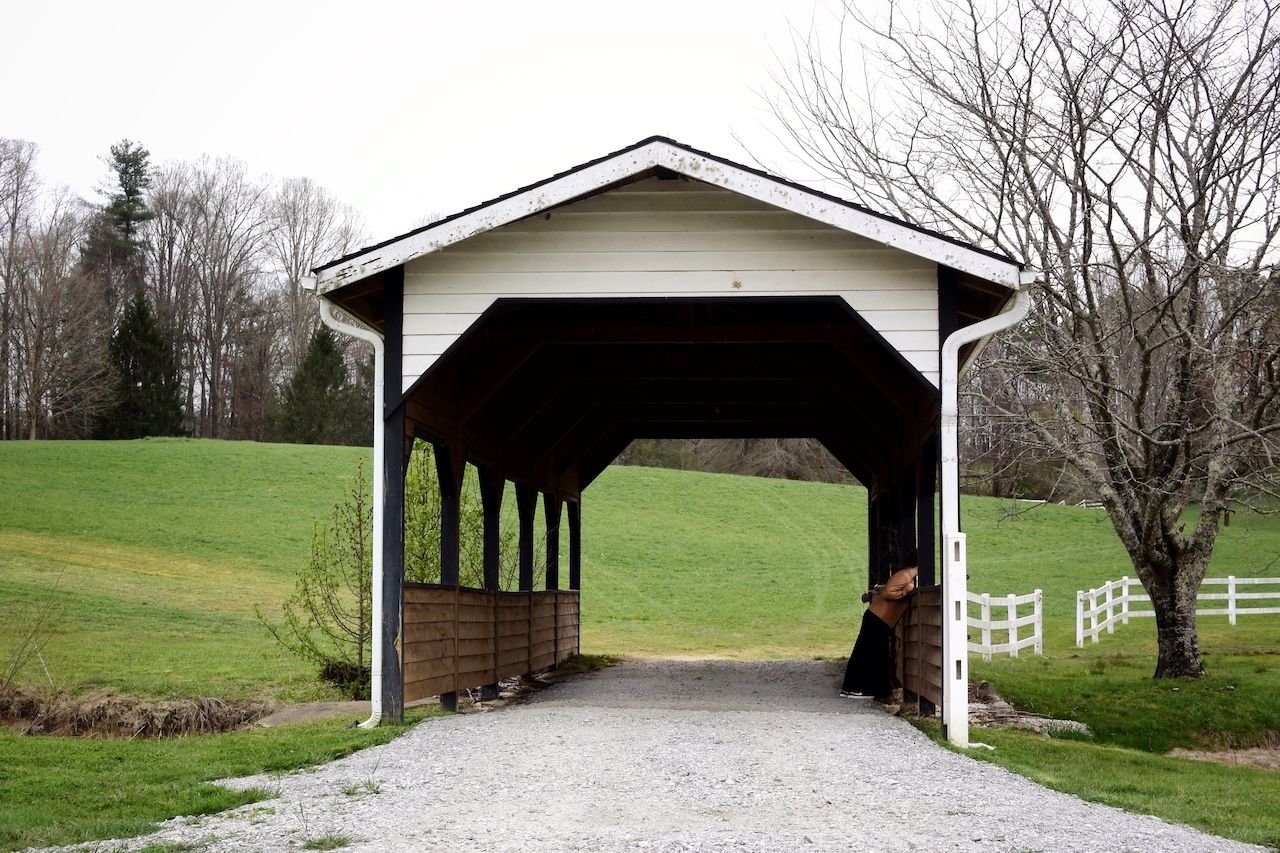
Photo: Nickolaus Hines
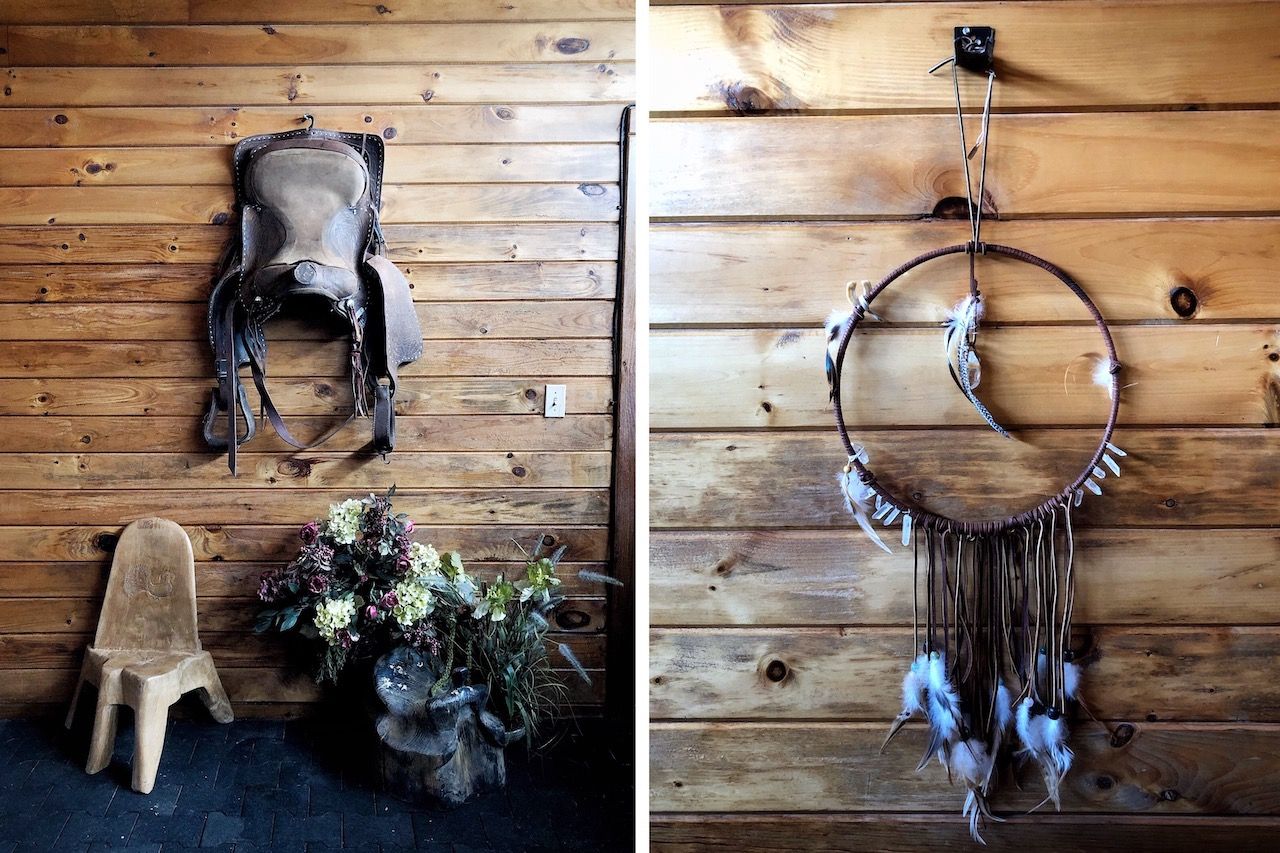
Photo: Nickolaus Hines
Retreats give people an excuse to disconnect, as well as all the tools to be present that aren’t available in normal day to day life.
“This is the time when you learn how to start your day with meditation, yoga, running or journaling, as a few examples,” said Dr. Michele Reed, a family physician who runs a wellness retreat in Jamaica. “When you are totally disconnected you are able to focus on you and no one else and their issues.”
Being disconnected, a crucial part of most wellness retreats, has a much better track record for improved mental health than general wellness.
“When a person invites technology into the home, there’s no stop button on what data is coming in. Wellness retreats provide exactly this,” Dr. Kate Cummins, a California psychologist, said. “They disconnect individuals from stimulus overload by creating a safe space that is protected and valued on being rather than doing. Performance and goal directed behavior is let go of during wellness retreats so that a person can connect to the here and now.”
Excessive phone use has been linked to depression, sleeplessness, and stress. Phones are inextricably linked to modern work, yet also have been shown to decrease productivity, thereby opening the door for more work-related stress. It’s this stress, in part, that drove Horse Shoe Farm into existence in the first place.
Nature-made wellness
Turchin went to University of Southern California and New York University, and regularly traveled between New York, Los Angeles, and Miami. At 20, he was diagnosed with an autoimmune disorder and prescribed medication. He started researching where his food comes from and ways to find more balance in his life. When his wife, Rachel, became pregnant in 2017, they went back to family in Miami. His dad, John, told him about a farm he owned up near Asheville. By the summer of 2018, Horse Shoe Farm opened for business as an event venue and luxury farm, and the first group was a Kosher family of 50.
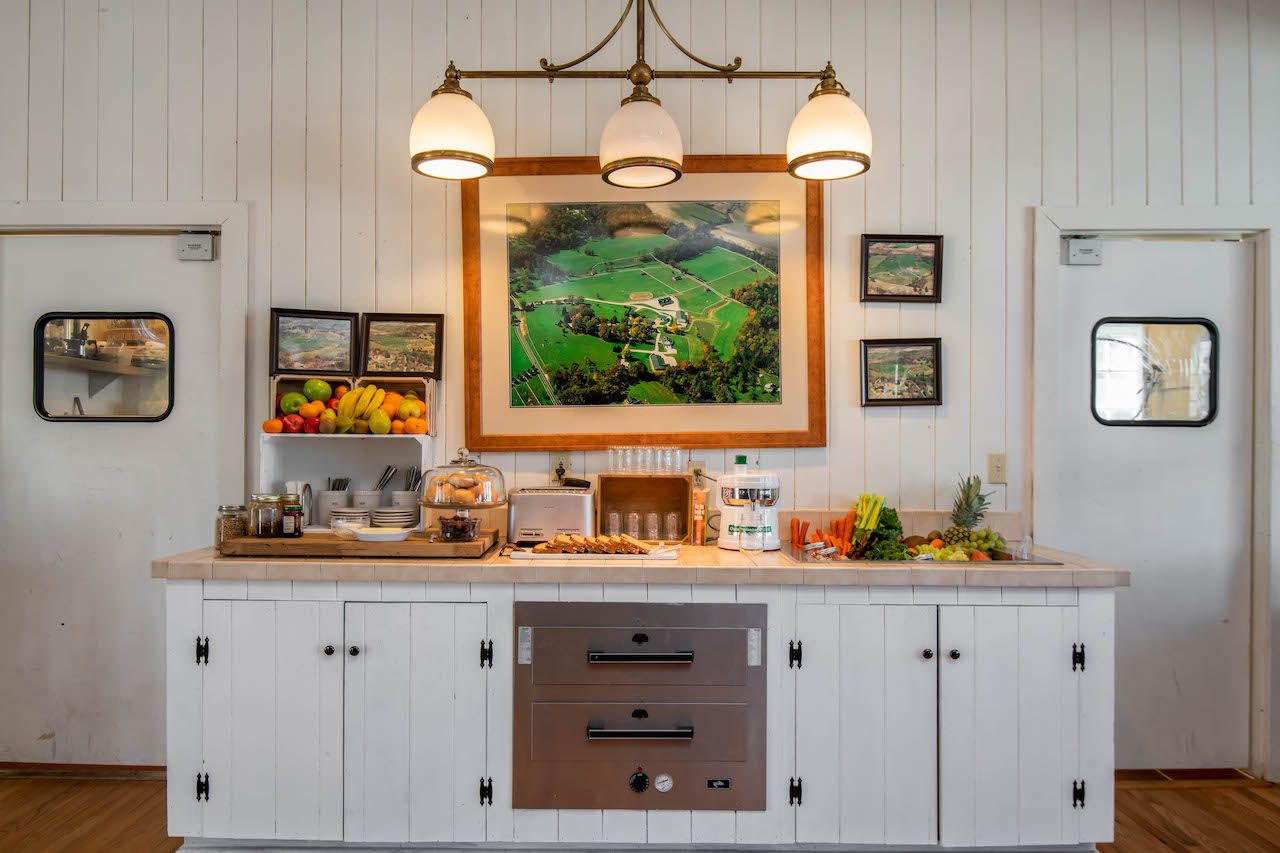
Photo: Horse Shoe Farm
Today, the farm has an extended suite of options to fix guests’ mental state. People can pick and choose like it’s the Chipotle of wellness retreats. Juice your own juice for breakfast, but don’t feel like you need to do a full-on juice cleanse. Walk the property’s 85 acres while it’s still covered by mist from the Blue Ridge Mountains, or just sleep in. Bike, play ping-pong in the game room, fish, and paddleboard, or just post up in the meditation room at the top of a converted grain silo and breathe.
Things happen for a reason here, Turchin told me multiple times, and you take advantage and roll with it.
“I’m the opposite of believing in anything culty or pushing someone to do something or go in a certain direction,” he said.
In the spirit of wellness and taking advantage of what’s available, I signed up for the morning yoga class in the meditation room with my girlfriend, Heather. This is despite the fact that I can’t touch my toes and the closest thing I’ve done to yoga was once attempting to follow a YouTube video.
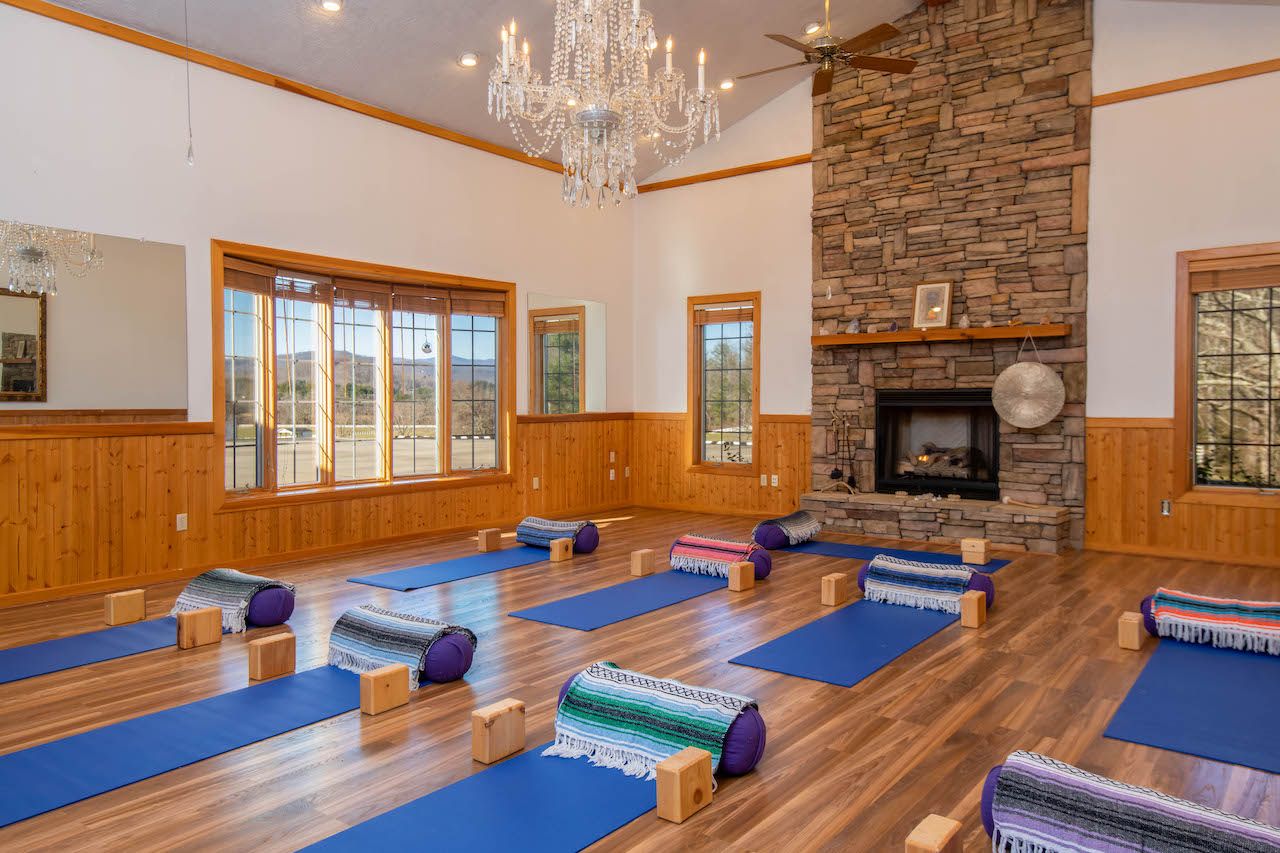
Photo: Horse Shoe Farm
Still, the instructor, Amber, was one of those high on life people who make it seem okay to try. A fire behind her heated the room and songs about breathing in and out played over the sound system. She laughed while talking to us a little about herself, then encouraged us to do the same. This should be easy enough, I thought from my corner in the back. Two-thirds of the way through and one Amber-assisted move later, my thoughts mostly centered on how I didn’t think I was supposed to be sweating that much during a basic yoga session.
The family style dinner the night before, and the post-dinner glass of wine by the fire, was more my speed. Though it probably didn’t help with the morning yoga, it was a nice reminder that the point of a wellness retreat is to do what makes you happy. Mental wellness doesn’t have to be about deprivation, other than the deprivation of all the screens causing you stress. As Turchin put it, “If you come here and you’re a vegetarian or vegan, great. If you want to eat meat and have a drink, you can.”
Meat and drink can lead to interactions you wouldn’t have had otherwise, after all. Without that fireside wine, John wouldn’t have had a chance to point out the spot toward the French Broad River where people kept seeing a ghost in a top hat. We also would’ve missed out on learning about the work Turchin’s done with healers to clear out the bad energy on the land, which has evidence of both Native American and Civil War activity.
Human interactions like these are rare in New York, or at least, you’re rarely in a welcoming mood to embrace them. In the safe space created by Horse Shoe Farm, conversations are calming and connections come easy. It made me feel that maybe strangers can get together and talk without it veering into a divisive garbage fire of debate. A feeling, I thought at the time, that I’d forget as soon as I got back on the internet.
The long-term benefits of wellness retreats
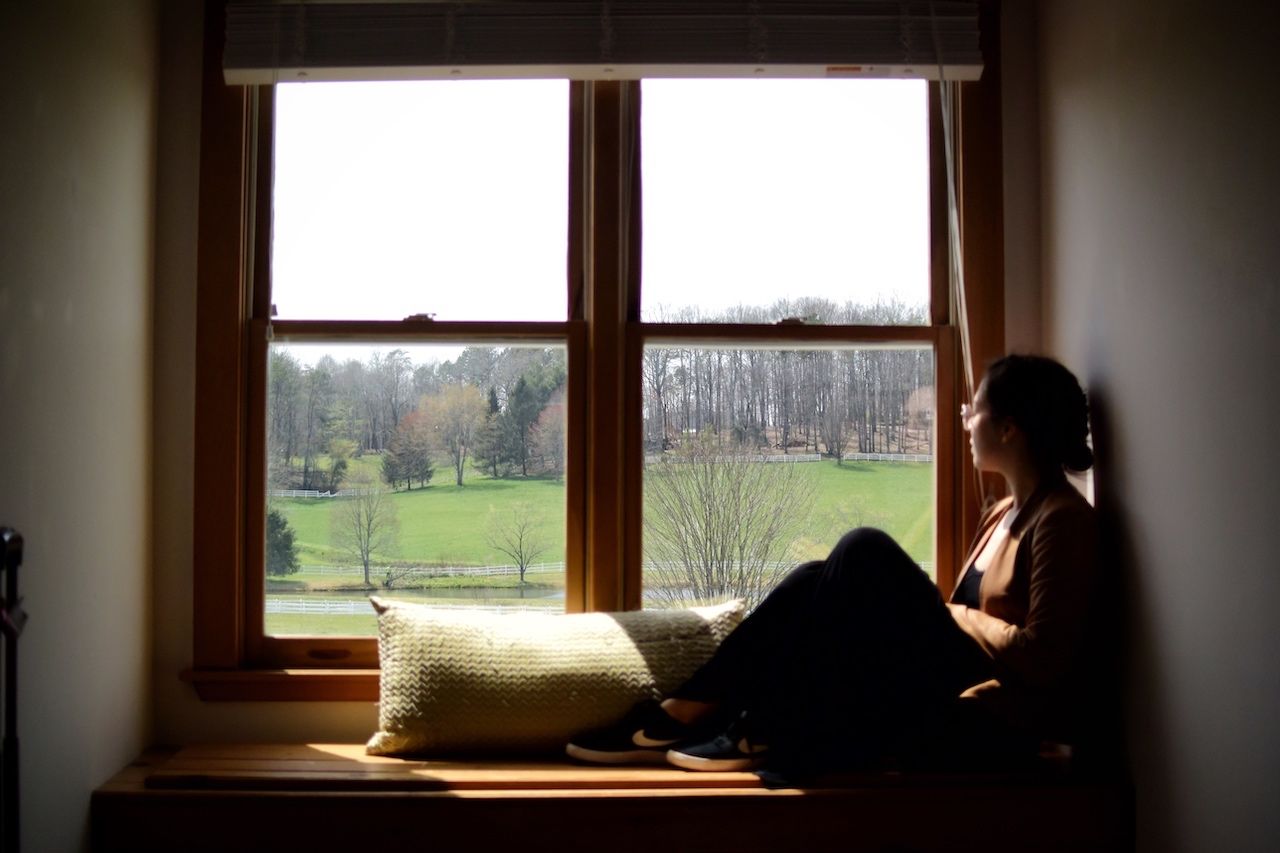
Photo: Nickolaus Hines
While there aren’t many studies out there about how our mental state resets after a retreat, from an expert perspective, the long-term effect doesn’t look promising.
“If the concepts are not embraced and internalized, the benefits of the wellness retreat may slowly fade within the first few days or weeks after returning to regular patterns,” Manly said. “And, after three months, the benefits may have been forgotten and all but erased from the psyche. It is for this reason that many wellness retreat aficionados find themselves hankering for another retreat several months later.”
Longer stays generally lead to longer results. “After 21 days, whatever you have learned and practiced are more likely to have become a habit,” Reed said.
To get anything long-term out of my wellness trip, I knew I needed to learn something that could stick with me — something like meditation.
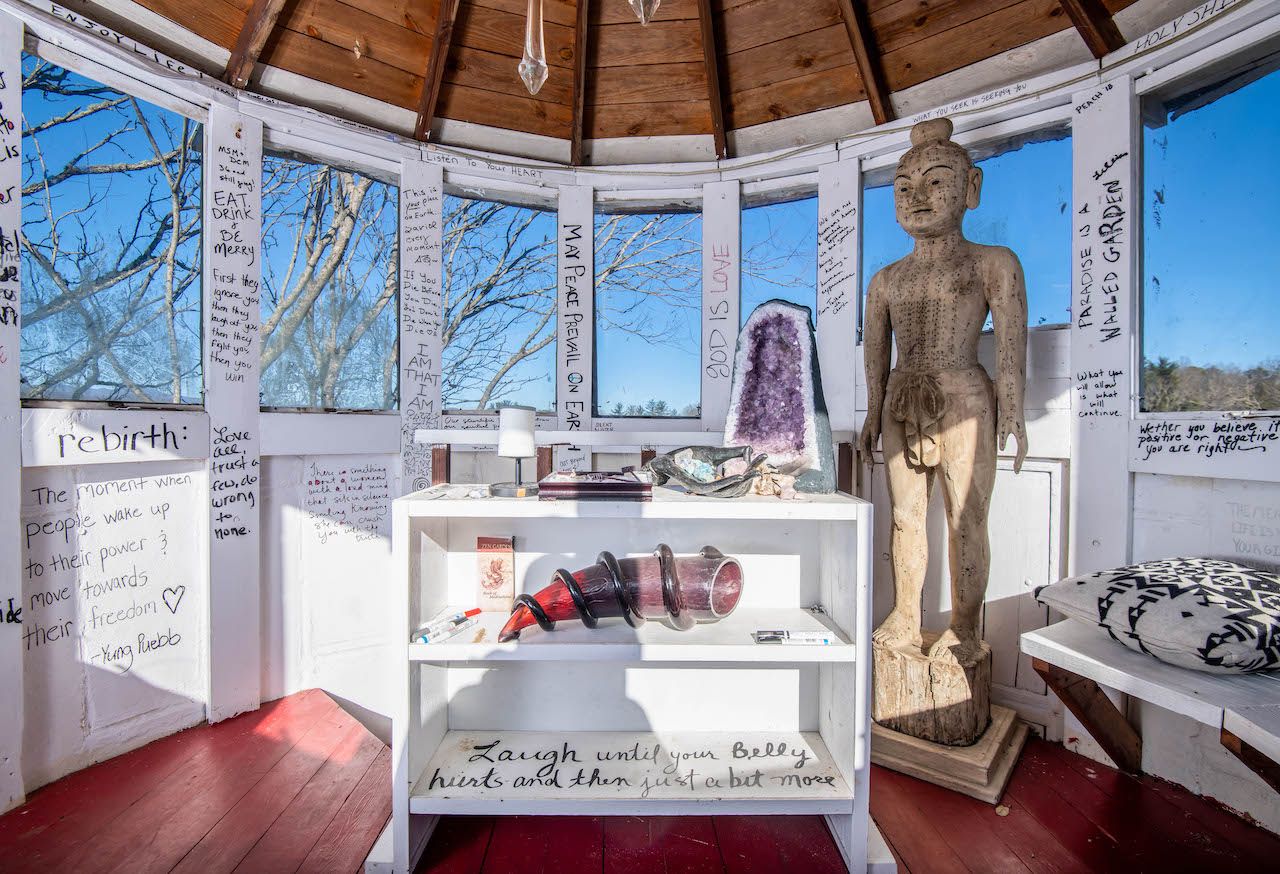
Photo: Horse Shoe Farm
Near the main building on the farm, a former grain silo is now an interactive meditation silo. A steep winding staircase leads to the top, and the walls are lined with handwritten inspirational quotes written by unnamed passersby, large initials the only indication of who left what. At the top sits a small sand garden surrounded by gemstones, a sitting area, and a wooden human statue the size of a tween. An instructional book helps those new to mindfulness find their way, which means it’ll tell you what you’re supposed to do with a sand garden.
The view from the top is enough to take your breath away, especially at sunset. The entire grounds are laid out in front of you, and, depending on your eyesight, you can see up to the edge of the mountains and over the goats, chickens, and ducks in the animal pen.
Inside, it’s easy to get lost among the sayings written on the walls. Most veer closer to something saved on someone’s Pinterest board than anything original. I found myself wondering more than once how many people pulled out their phone to find the perfect quote. A version of “Not all those who wander are lost” makes more than a couple of appearances, as does “Namaste” and the peace sign. Bible quotes have more than their fair share of space, and if you look at the windowsill after observing the rooster outside you’ll see, “Whether you believe it’s positive or negative, you are right.”
But what’s said doesn’t really matter, because the point of the silo is to look inside yourself, not inside the silo. I don’t add my two cents of Pinterest quotes. I do leave with a self note to take more time in peaceful places.
So are wellness retreats worth it?
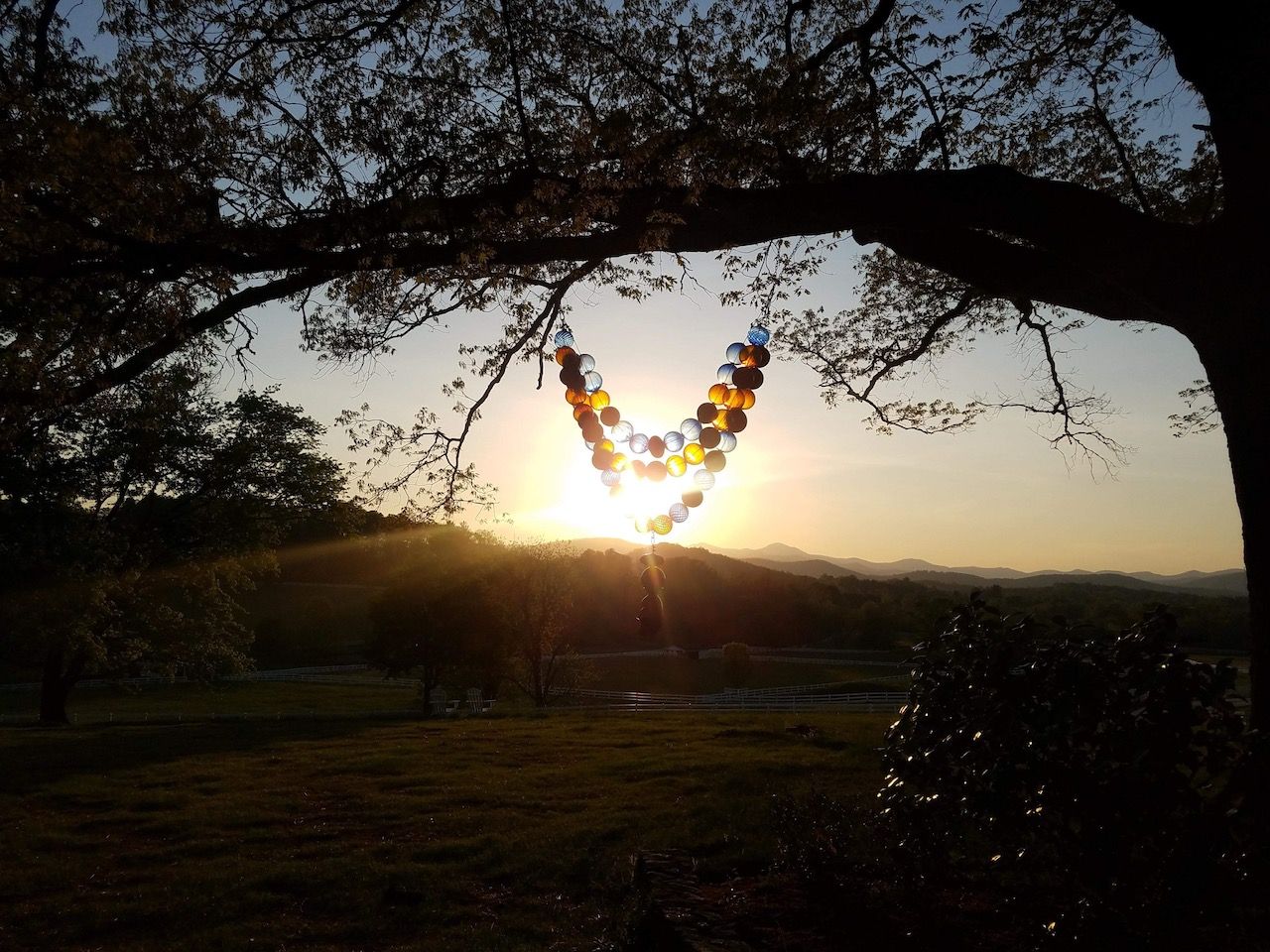
Photo: Horse Shoe Farm
“The truth is, a person has to believe in something in order for it to ‘work,’” Cummins said. She compared it to team sports and believing in winning. “We are what we believe. If someone doesn’t believe that a wellness retreat will work, he or she is probably resistant to letting go of perceived control of life. With a little bit of time in the space of a wellness retreat, even if the person doesn’t fully believe in the practice or lessons provided, he or she is still getting a break and rest from stress in their day to day functioning, which, by product of the decision to take time away from stress, creates space for the wellness retreat to ‘work’ in his or her life regardless of the belief going in.”
It also takes work after the retreat ends to keep the good vibes going.
“It’s much like the post-care required after a visit to the dentist’s office—if you don’t continue to maintain your teeth with good daily care (like flossing and brushing), you won’t find optimal benefits,” Manly said. “In the same way, the practices and self-care strategies offered in the wellness retreat must be put into daily practice in order to experience lasting and ongoing benefits.”
I admittedly could have used this advice before getting to the farm. I travel the US and abroad about once a month, and getting away from it all doesn’t feel that difficult on the surface. It’s a little more complicated when I accept that I’m also very much addicted to work, my phone, email, and social media. I disconnected as much as possible on the farm, but it wasn’t until my last day that I noticed how much a wellness retreat can really reset a person.
After our (sweaty, why so sweaty?) yoga session, my girlfriend and I sat by the French Broad River with a fishing pole, killing time before a scheduled massage. I hate massages, she loves them. The only massage I’ve enjoyed came exactly one hour and 15 minutes after eating a strong edible. Yet both of us were on the massage schedule at Horse Shoe Farm.
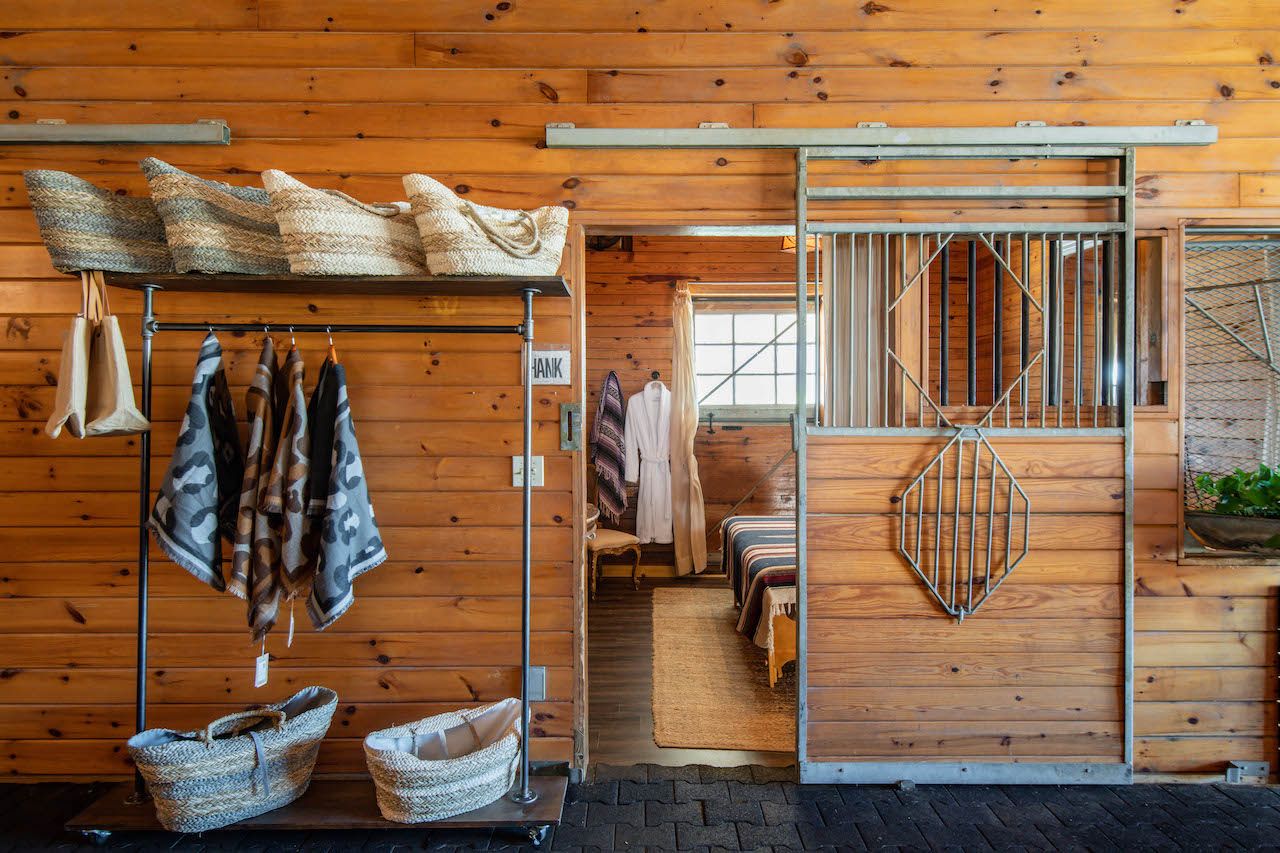
Photo: Horse Shoe Farm
Walking toward the stables, I thought about Turchin saying everything at the farm falls into place and happens as it should. Go with the flow — that’s how his family’s eclectic art got to the farm, and how he’s learned how to run a farm bit by bit. I admitted to Heather that I really did not want a message.
When we arrived, there was only one masseuse. She looked at me and asked if I was the one getting the massage, unaware that there were supposed to be two. She offered to do one and then the other, but this was, to me, a clear sign of what Turchin was talking about. I gladly passed my time to Heather, grabbed a book, and read in the sunlight with the birds chirping and baby goats bleating in the background. This was the reset I needed.
The best escapes let you choose your own wellness adventure to learn from. I found my place of mental wellness, and it won’t be the last time I seek it out.
